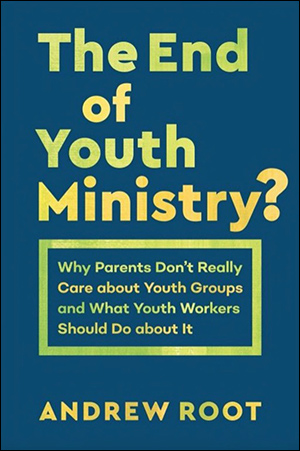Book Review: The End of Youth Ministry? Why Parents Don’t Really Care About Youth Groups and What Youth Workers Should Do About It

The End of Youth Ministry? Why Parents Don’t Really Care About Youth Groups and What Youth Workers Should Do About It (Amazon) by Andrew Root. Baker Publishing, Grand Rapids, MI, 2020. Total Pages: 225.
For anyone, volunteer or paid, involved in children and youth ministry, a book with such a title calls out to be devoured. Andrew Root serves as a professor at Luther Seminary in St. Paul, Minnesota, and writes prolifically (The Pastor in a Secular Age [2019], Faith Formation in a Secular Age [2017], Bonhoeffer as Youth Worker [2014], The Relational Pastor [2012), The Theological Turn in Youth Ministry [2011], Revisiting Relational Youth Ministry [2007]). In this particular book, Root tackled the relevance of youth ministry as it exists in the Western Christian Church today.
Written in accessible language, Root utilized a first-person narrative style that enjoins the reader on his fictional quest to find the purpose of youth ministry. Root explored the origins of current societal parenting trends and how they shaped youth ministry objectives. By looking at why and how happiness has become the ultimate goal in identity development, Root served as a guide through history to the present day to reveal the often subconscious philosophical motivations which drive individuals in western society. Drawing on philosophers and pop culture alike, Root seldom gave a negative tone or accusatory intent, but rather a realistic examination of why and where the state of adolescent identity formation occurs and why there might be a better way. From Aristotle, Martin Luther, Dietrich Bonhoeffer, Charles Taylor, to Taylor Swift, Sheryl Crow, and Demi Levato, Root wove his way through history and philosophy to answer the question: What is youth ministry for? Through his examination, one comes to understand the why behind many failures of youth ministry and how to reorient ministry more broadly. This includes more than just youth; it calls for the empowerment of families to redirect their lives in a Biblical journey of identity and happiness.
Root has his finger on the pulse of adolescence and young adulthood identity development in western, middle-class society. He explained the teen developmental process as a construct of identity creation primarily facilitated by parents to slow their children’s move into adult experiences. Youth ministry might be serving parents more than youth. How? For the past 60 years, parents have needed someone to help them have their children experience happiness and identity achievement. Modernity’s emphasis on such identity has led parents to pressure youth ministry to make that its primary purpose. Because parents view identity achievement as the means toward happiness, they compel those in youth ministry to pursue this path.
The End of Youth Ministry? may be just as insightful for the reader personally as for the state of youth ministry. Root contended that the authenticity movement had brought the idea that only a steady, never-ending state of happiness is the ultimate goal. Identity discovery will help young people achieve the resulting state of happiness. Parents then become helicopters and bulldozers at the same time, ensuring nothing gets in the way of their child truly discovering an identity and thereby achieve full happiness. Youth ministry merely becomes one more tool for this journey. Root contested this assumption of happiness being the ultimate goal with identity formation as the means to that end.
But isn’t the goal of youth ministry for young people to encounter Jesus? Don’t youth leaders want the narrative of each young person’s life to interact with Christ’s story so self may die, and Christ will live in them? This experience of the “Good” as Root termed it, is the experience of God in Christ, experienced as joy, not happiness. Joy finds its experience in God being a part of the good and bad of life. Because Christ is present, we find our identity in our death and resurrection with Him. Root showed why this is necessary more than ever to have as a focus for youth ministry. It is the response so desperately needed for this late modernity society that sees life as immanent and no longer transcendent.
By often restating pivotal concepts, Root linked the turns in his journey so the reader can know where they are and be reminded of how they got to this point. This also serves to reinforce what was covered and to connect it to his next concept. While at times Root reached far in order to connect pop culture references with Martin Luther, the connection between the past and the present was necessary for understanding current culture and how we arrived at our present state. The discussion of philosophy, theologians, and their influence is communicated in clear and enjoyable ways (who knew Martin Luther was responsible for Disney World?!). But there is a lack of equal theological and biblical discussion on what has led the Church and society to almost full acceptance of the authenticity movement of late modernity, which has so profoundly shaped modern Protestantism, and in particular, Evangelicalism.
In the book’s Warning (introduction), Root acknowledged the dominance of an American, middle-class, Western Christianity perspective, and rightly so as that is where the most common identity is found for Youth Ministry as an entity. The book missed a discussion of how this all applies to different ethnic and economic groups. For example, the author never addressed the drive among the socio-economically disadvantaged to fight for their access to financial security and happiness and how that affects ministry in those areas.
Even though Root specifically applied this discussion to youth ministry and its current form, his work broadly applies to church ministry at large, especially when incorporating an intergenerational framework. For any new or seasoned youth worker, or anyone who desires to understand and minister to youth in a Western context, The End of Youth Ministry? is a clarifying wake-up call to restore Jesus as the center of one’s life, and to make experiencing joy as found in encountering and losing one’s identity in the Cross the cornerstone of any ministry to all ages.
 |
Derek Richter, MDiv, who is the campus chaplain at Coralwood Adventist Academy in Edmonton, Alberta, Canada. |
